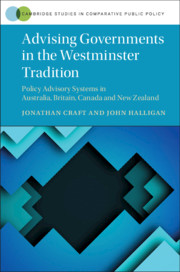 Advising Governments in the Westminster Tradition
Advising Governments in the Westminster Tradition Published online by Cambridge University Press: 18 December 2020
Internal non-public service sources of policy advice cover parliamentary committees, public inquiries and other bodies that operate within the broader public sector. Some units have substantial independence, while others may be at the beck and call of ministers. The spectrum ranges from bodies located within government with permanent standing to those existing under ad hoc arrangements that may include external actors. Advice is distinguished by whether it is solicited or not, the former being commissioned by government (e.g. taskforces) and the latter being about the capacity to influence policy. Three categories of alternative policy advice within government are independent policy advisory bodies; agencies that report to parliament rather than the executive; and ad hoc entities that operate as extensions to government and comprise a range of government appointed inquiry forms.Each has changed with implications for the policy advisory system, although depoliticisation and politicisation are factors. The institutionalisation of independent standing bodies is notable. The trend to flexible instruments has allowed governments to reduce reliance on formal and independent public reviews. The expansion and contraction of alternative sources of advice has occurred over time and varies between countries, but the broad trends have been similar.
To save this book to your Kindle, first ensure [email protected] is added to your Approved Personal Document E-mail List under your Personal Document Settings on the Manage Your Content and Devices page of your Amazon account. Then enter the ‘name’ part of your Kindle email address below. Find out more about saving to your Kindle.
Note you can select to save to either the @free.kindle.com or @kindle.com variations. ‘@free.kindle.com’ emails are free but can only be saved to your device when it is connected to wi-fi. ‘@kindle.com’ emails can be delivered even when you are not connected to wi-fi, but note that service fees apply.
Find out more about the Kindle Personal Document Service.
To save content items to your account, please confirm that you agree to abide by our usage policies. If this is the first time you use this feature, you will be asked to authorise Cambridge Core to connect with your account. Find out more about saving content to Dropbox.
To save content items to your account, please confirm that you agree to abide by our usage policies. If this is the first time you use this feature, you will be asked to authorise Cambridge Core to connect with your account. Find out more about saving content to Google Drive.